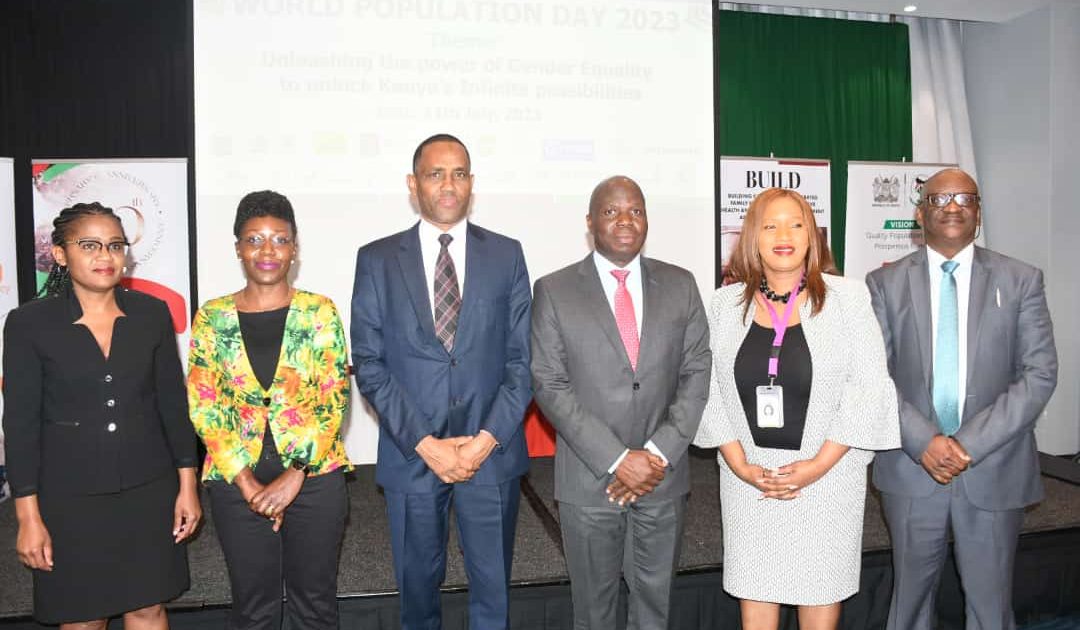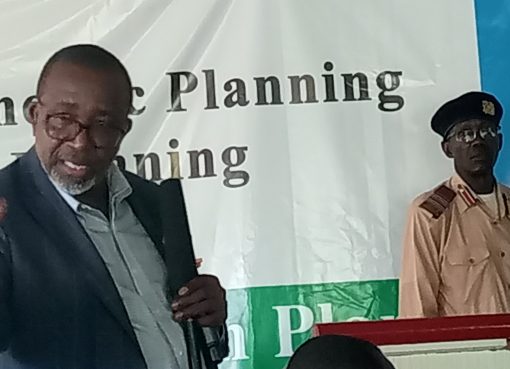The National Council for Population and Development (NCPD) held the World Population Day Celebrations Tuesday with the aim of Unleashing the Power of Gender Equality to Unlock Kenya’s Infinite Possibilities.
Economic Planning Principal Secretary James Muhati, speaking during the event, stated that gender equality refers to equal rights, responsibilities and opportunities for women, men, girls and boys and is essential in achieving peaceful societies with full human potential and sustainable development.
According to the 2019 Kenya Population and Housing Census, the percentage of female population in Kenya was 50.31% compared to 49.69% of male population, while the population of boys aged 0–18 years was 50.47% compared to girls at 49.53%.
Muhati added that there has been a notable gender wage gap, with women earning less than men for comparable work, where the average monthly earnings for women were Sh12,166 compared to men’s at Sh18,594.
“Gender-based violence has been acknowledged worldwide as a violation of basic human rights. The 2022 Kenya Demographic and Health Survey (KDHS) shows that 41% of women and 36% of men who have ever had an intimate partner reported having ever experienced economic, emotional, physical or sexual violence by their current or most recent intimate partner,” Muhati voiced.
The PS highlighted that girls are less likely than boys to complete secondary education often due to early marriages, adolescent pregnancies and domestic work.
He added: “The government of Kenya has put in place initiatives to promote gender equality. There has been a deliberate effort to facilitate women’s economic empowerment by increasing access to credit and entrepreneurship opportunities. Initiatives such as Access to Government Procurement Opportunities (AGPO) are aimed at facilitating enterprises owned by women, youth and persons with disabilities to be able to participate in government opportunities.”
This inclusivity, added the PS, shows the country is committed to ending Female Genital Mutilation (FGM) by strengthening coordination in the areas of legislation and policy framework, communication and advocacy, evidence generation and supporting cross-border collaboration on the elimination of FGM.
“Women and girls represent half of the world’s population, hence the need for mentoring girls to pursue Science, Technology, Engineering and Mathematics (STEM) as well as trade specialization including the digital and green economies,” said Muhati.
He explained that the country is preparing to launch the Fourth Medium-Term Plan 2023–2027 of Kenya’s Vision 2030.
At the same time, the Director General of NCPD, Dr. Mohamed Sheikh, said that July 11 is a day designated by the United Nations (UN) as a day to commemorate World Population Day and is marked to educate the public on key population concerns, progress and achievements.
NCPD is a semi-autonomous government agency under The National Treasury and Economic Planning mandated to coordinate the implementation of population and development programmes and policies in Kenya.
The Council is the national focal point for leadership and guidance in matters relating to population and development.
“Some of the strategic objectives aligned to the Council’s mandate include enhancing public education and advocacy, coordinating the implementation of population policies and programmes, integrating population variables in development planning at the national and county level, and strengthening capacity in research, data analysis, and visualisation,” Dr. Sheikh noted.
At the same time, National Gender and Equality Commission CEO Betty Sungura said that understanding population data has a vital role in shaping development plans based on evidence, formulating policies effectively, and conducting research diligently.
“We stand at a critical time, where advancing gender equality is no longer an option but a necessity; gender equality is not just about redressing the balance but about creating a stronger, more equitable and more sustainable world,” she voiced.
Sungura revealed that in Kenya, despite women making up slightly over 50% of the population, they only hold about 23% of seats in parliament, and more men also own assets such as houses and land.
However, the CEO cited that gender inequality has several negative consequences, including increased poverty, poorer health outcomes, less education, less political participation and decision-making processes.
“Let us capitalise on this moment to reaffirm our dedication to achieving gender equality and eradicating discrimination. By collaborating harmoniously, we can forge a future wherein every individual has an equal opportunity to flourish and make valuable contributions towards Kenya’s progress,” Sungura disclosed.
By Rebeccah Maria and Daisy Masinde



